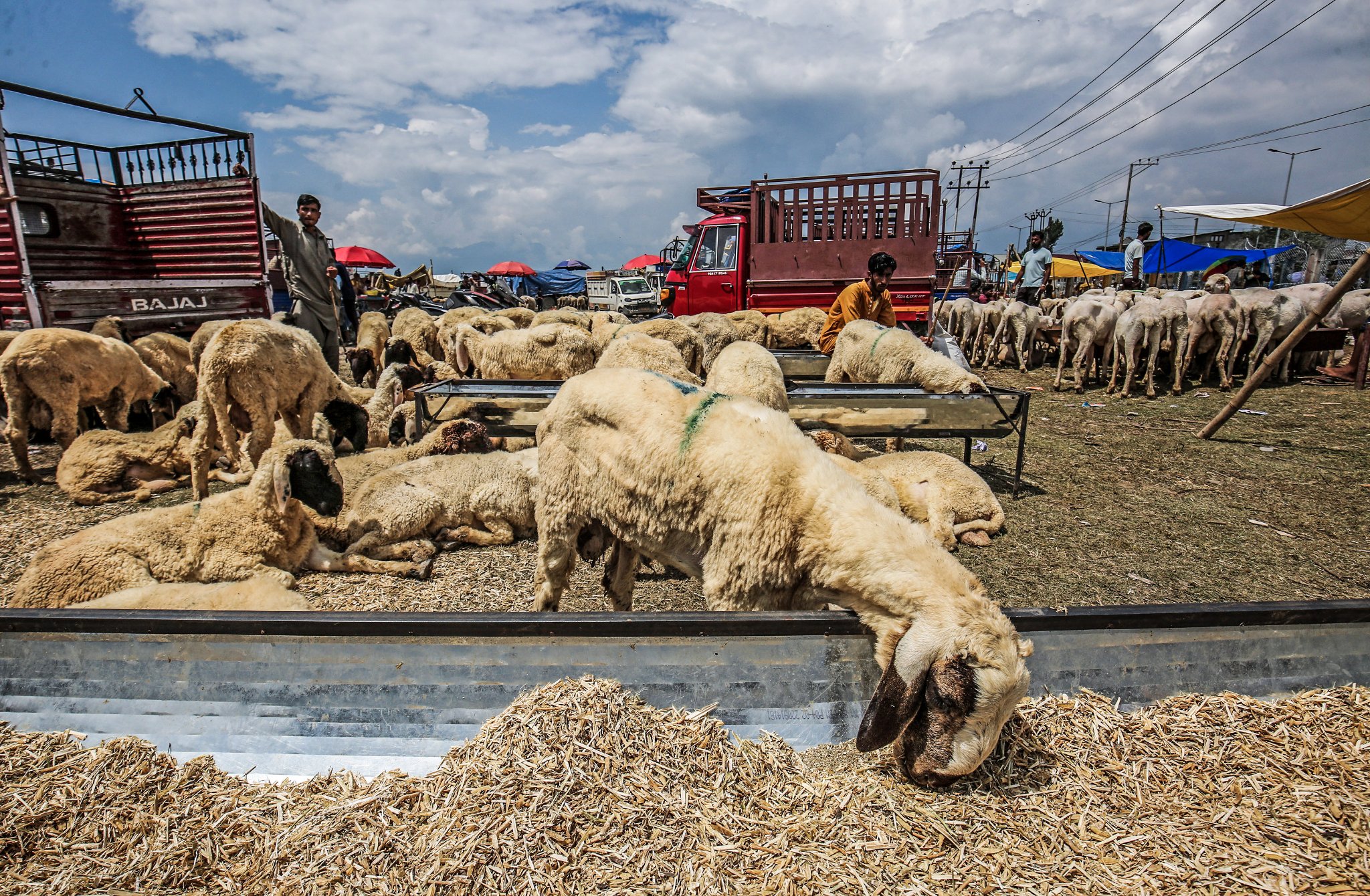
Picture: Abid Bhat
JAMMU, FEBRUARY 12 : In view of huge mutton usage in Jammu and Kashmir, especially in the Kashmiri cuisine and in order to reduce meat import in the Union Territory, the government has approved an ambitious Rs 329 crore project for next five years to achieve self reliance in Mutton sector.
The project is aimed at creating 6000 jobs besides setting up of 122 enterprises in the mutton sector in the Union Territory.
The initiative also envisages achieving self-reliance in the mutton sector through a combination of innovative interventions including vertical upgrades, horizontal expansion besides focused attention on health cover and nutrition.
One of the major interventions planned is import of muttonous breeds, which will lead to establishment of 72 breed-based farms to provide high genetic merit to animals.
Additionally, the project aims to conduct 1,00,000 Artificial Inseminations (AIs) annually and establish 400 new commercial farms every year. The project also focuses on clusterization, creation of mandis, abattoirs and common facility centers (CFCs), to support marketing and value addition of the sector.
“Investing in growth and improvement of mutton sector in J&K is not only about boosting production and reducing import costs, but it is also about providing quality and safe meat to consumers, improving the livelihoods of traditional farmers besides creating new job opportunities in the region.”, said Atal Dulloo, Additional Chief Secretary, Agriculture Production Department.
He added: “Apart from increase in production and productivity forward linkages, which are acutely lacking in the sector, will be established through formation of 50 Farmer Producer Organizations and Self Help Groups with linkage to 10 new abattoirs and in-built value chains integrated with 10 sheep mandis and 50 CFCs.
Mutton has been an essential part of the Kashmiri cuisine for generations and Jammu and Kashmir, with its rich cultural heritage and diverse geography, has a significant demand for mutton. Despite the regions competitive advantage and potential to become self-reliant in the mutton sector, there is a shortfall of 41 per cent leading to an import bill of 1400 crore every year.
Additionally, the existing mutton production is not only of insufficient quantity but also lacks quality and is not FSSAI compliant, putting consumers at risk.
The majority of the livestock population is held by Bakerwals who follow traditional methods of farming, resulting in low productivity and profits. The UT has less than five breeds of sheep with the majority being dual purpose breeds such as Kashmir Merino, Rambouillet, and Corriedale. However, there is increasing demand for fast-growing mutton breeds like Dorper, Romnov, South Down and others.
‘Reorienting priorities: Self-Sustenance in mutton production’ is one among the 29 projects, which were approved by the Jammu and Kashmir administration after being recommended by the UT Level Apex Committee for holistic development of Agriculture and allied sectors in UT of J&K. The prestigious committee is being headed by Dr Mangala Rai, Former DG ICAR and has other luminaries in the field of Agriculture, Planning, Statistics & Administration like Ashok Dalwai, CEO NRAA, Dr. P. K Joshi, Secretary, NAAS, Dr. Prabhat Kumar, Horticulture Commissioner MOA & FW, Dr. H. S Gupta, Former Director, IARI, Atal Dulloo, Additional Chief Secretary, APD besides Vice Chancellors of the twin Agriculture Universities of the UT.
The expected output from the project included import of 2700 high genetic merit/elite sheep and goats, increased lambing percentage from 80 to 120 and considerable reduction in marketable age for sheep and goats (40-50 kg in 6 months). The germplasm of the elite animals will be propagated through artificial insemination and embryo transfer techniques to intensify genetic conversion. The project aims to double the farm income through early weight gain, improved carcass yield and production and reduce lamb mortality. Effective health cover is expected to prevent production losses by 20-30% and provide consumers with safe and quality meat.
The project is anticipated to bring significant benefits to farmers and consumers in Jammu and Kashmir. The creation of commercial farms and establishment of breed-based farms will boost mutton production and improve the quality of meat available to consumers. The marketing and value addition initiatives will help farmers get better returns for their produce, while health cover and nutrition interventions will reduce production losses and improve the overall well-being of the animals. The project will also create job opportunities and promote entrepreneurship, contributing to the economic development of the region.
Ultimately, the project which is aimed at to achieve self-reliance in the mutton sector in Jammu and Kashmir, is a crucial step towards meeting the growing demand for mutton in the region. The project also intends to address the shortcomings in the existing mutton production and provide consumers with safe and quality meat. The project is also likely to bring numerous benefits to farmers and consumers, create job opportunities and contribute towards overall economic development of the region.
